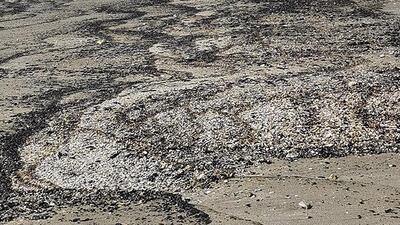Pollution from an oil spill has washed up along the east coast, forcing the authorities to close a public beach in Sharjah.
Residents reported the 3-kilometre oil slick along Kalba beach to authorities on Sunday.
It is the third oil spill reported along the east coast of the UAE this year.
Last month, oil washed ashore in Khor Fakkan in Sharjah and a slick was reported at Al Aqah in Fujairah in March.
Kalba Municipality, Sharjah Environment and Protected Areas Authority and the environmental management company Beeah organised a clean-up of the beach after police closed it to the public.
A resident of the area said oil could be smelt from far away.
“We received photos of oil covering the sand from people who were at the beach around 6am,” said the resident, who shared the images on the Hisn Kalba Instagram account.
“I went there myself to check and found long trails of oil along the beach, and it produced a foul smell that can be noticed from far away.”
Shamsa Al Ketbi, director of the support services department at Sharjah Environment and Protected Areas Authority, said parts of the beach might have to remain closed for the rest of the week for cleaning.
“Cleaning the oil without affecting the sea creatures that live beneath the sand on the beach is a very delicate process and requires no machinery, only by hand,” Ms Al Ketbi said.
“It will take time to clean the entire area.”

She said inspectors were sent to the area to take samples of the water and check for signs of pollution.
“No signs of a direct effect on marine life or water pollution were noticed but the cleaning process might take until after Eid, as the oil was found in varying proportions along the coast,” she said.
An aerial scan was carried out with the coastguard to check for any other oil spills that might have been washed ashore.
“We do not know the exact cause but we are working on a plan to include a monitoring system to spot the oil spill before reaching the coastline,” Ms Al Ketbi said.
Oil spills typically occur when vessels clean their tanks by flushing any residue from their tanks into international waters.
The black sludge inevitably washes ashore, causing damage to marine life and ecosystems.
This month, a UAE government official called for increased surveillance of tankers so that swift punishment could be delivered to operators of boats who broke the rules.
Adnan Al Hammadi, a member of the Federal National Council, called for investment in upgrading the technology used to monitor the movement of tankers in Gulf waters.
Under the UAE’s Federal Law No 24, all means of marine transport are prohibited from discharging oil or disposing of it in the sea.
Penalties include imprisonment and fines of up to Dh1 million, but most of these incidents happen in international waters, where it becomes more difficult to police.

